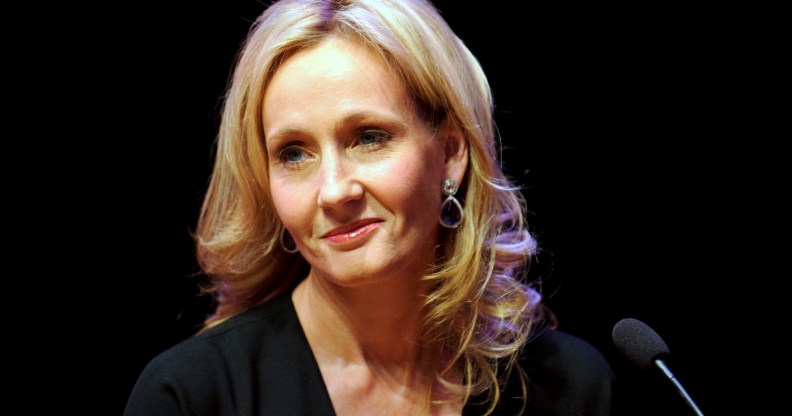JK Rowling suggests she ‘might have transitioned’ if given the option when younger, wrongly linking gender identity with mental health

JK Rowling. (Ben Pruchnie/Getty Images)
Harry Potter author JK Rowling has penned an essay in which she attempts to explain her involvement in the anti-trans “gender critical” movement, and says that she has often “wondered” whether she might have transitioned had been a teenager today.
As outrage builds over Rowling’s repeated statements on trans people, the author decided it was “time to explain myself on an issue surrounded by toxicity”.
In the lengthy tirade, which covers many topics and excuses for her vehemently anti-trans views, Rowling made a surprising confession while also conflating being trans with mental illness.
She wrote: “The writings of young trans men reveal a group of notably sensitive and clever people.
“The more of their accounts of gender dysphoria I’ve read, with their insightful descriptions of anxiety, dissociation, eating disorders, self-harm and self-hatred, the more I’ve wondered whether, if I’d been born 30 years later, I too might have tried to transition.
“The allure of escaping womanhood would have been huge. I struggled with severe OCD as a teenager.
“If I’d found community and sympathy online that I couldn’t find in my immediate environment, I believe I could have been persuaded to turn myself into the son my father had openly said he’d have preferred.”
JK Rowling says it wasn’t a ‘realistic possibility’ for her to have transitioned in the 1980s.
While suggesting that her strained teenage relationship with gender was related to a diagnosis of OCD, an anxiety disorder, JK Rowling used a Simone de Beauvoir quote to say that despite her discomfort, she had to “accept” being a woman.
She wrote: “When I read about the theory of gender identity, I remember how mentally sexless I felt in youth.
“I remember Colette’s description of herself as a ‘mental hermaphrodite’ and Simone de Beauvoir’s words: ‘It is perfectly natural for the future woman to feel indignant at the limitations posed upon her by her sex. The real question is not why she should reject them: the problem is rather to understand why she accepts them.'”
She added: “As I didn’t have a realistic possibility of becoming a man back in the 1980s, it had to be books and music that got me through both my mental health issues and the sexualised scrutiny and judgement that sets so many girls to war against their bodies in their teens.
“Fortunately for me, I found my own sense of otherness, and my ambivalence about being a woman, reflected in the work of female writers and musicians who reassured me that, in spite of everything a sexist world tries to throw at the female-bodied, it’s fine not to feel pink, frilly and compliant inside your own head; it’s OK to feel confused, dark, both sexual and non-sexual, unsure of what or who you are.”
Rowling’s argument seemed to swing between conflating being trans with mental health problems, and gender dysphoria just being a part of growing up.
But her revelation becomes even more concerning when, in the paragraph before, she prefaces her experience by saying that “the argument of many current trans activists is that if you don’t let a gender dysphoric teenager transition, they will kill themselves”.
She uses a quote from a former Tavistock psychiatrist to argue that trans kids are not at “substantial” risk of suicide if they are not given gender-affirming care.
Scientific research and medical experts have confirmed that trans people have higher rates of anxiety, depression, suicide attempts and other mental-health issues – unless they are affirmed in their gender and given access to healthcare, in which case their mental health is comparable to that of their cisgender peers.
A recent academic study finding that puberty blockers can be “life saving” for trans teenagers.
The study, published in medical journal Pediatrics, found that if trans teenagers have access to the medication their chance of suicide and mental health problems significantly declines.

